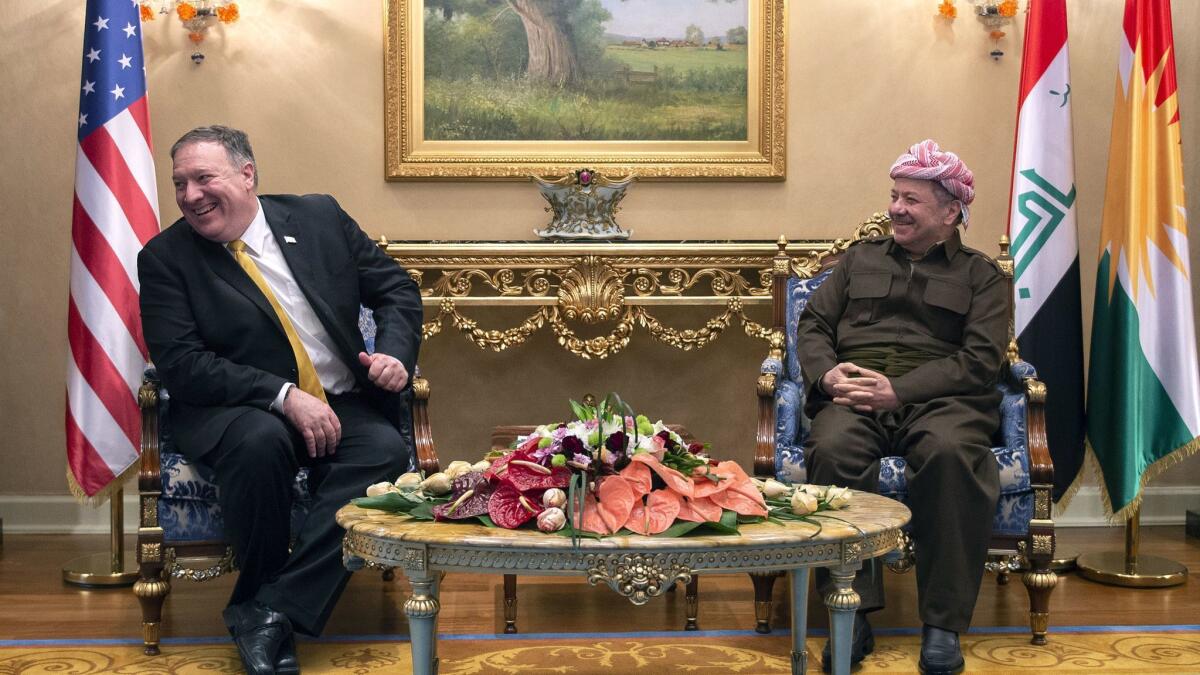In an unannounced trip to Iraq, Pompeo hears pleas for help against Islamic State

Reporting from Baghdad — Secretary of State Michael R. Pompeo on Wednesday made an unannounced trip to Iraq as part of his Middle East reassurance campaign, and heard pleas for more help in fighting Islamic State militants.
Pompeo is attempting to explain to Arab allies President Trump’s abrupt decision to withdraw U.S. troops from Syria and the many conflicting accounts of whether there is a timetable for the pullout and what it might be. He is traveling to at least eight countries in eight days, including Egypt, Saudi Arabia and most of the Persian Gulf nations.
Many in the region fear U.S. disengagement will empower Iran and separately allow for a resurgence of the radical Islamic State, which until recently controlled huge swaths of Iraq as well as parts of Syria.
At the government palace in Baghdad’s Green Zone of high security, Iraqi President Barham Salih thanked Pompeo for U.S. support over the years but asked that it continue and that Washington not abandon the region.
Contradicting Trump’s claims that Islamic State was defeated, Salih said the fight went on.
Islamic State “is defeated militarily,” Salih said, “but the mission is not accomplished.”
Building on a military offensive launched during the Obama administration, a U.S.-led coalition last year was able to dismantle Islamic State’s so-called caliphate, built through Iraq and Syria, and drive out most militants.
Senior administration officials, however, acknowledge that pockets of Islamic State remain and could reemerge if the United States leaves the region.
Pompeo made no public comments while in Baghdad, but a statement issued later by his office said he had assured Salih of the U.S. commitment to an “enduring defeat” of Islamic State.
From Baghdad, Pompeo traveled to Irbil in the Kurdish-dominated part of northern Iraq and met with the semiautonomous region’s prime minister, Nechirvan Barzani.
Speaking afterward to reporters, Pompeo said he believed Iraq was on the right course with recent elections but also acknowledged the challenges.
There was “a common understanding,” Pompeo said, that the battle to counter Islamic State “and the fight to counter Iran is real and important.”
”We will complete the mission of taking down the last elements of the caliphate before we depart.”
Confusion and consternation have roiled the Middle East since Trump’s abrupt announcement last month that he was ordering an estimated 2,000 U.S. troops, including Special Forces, to leave Syria. His aides’ attempts since then to clarify and modify Trump’s intentions have only added to the confusion.
Pompeo also pushed back on harsh statements from Turkish President Recep Tayyip Erdogan, who rejected U.S. entreaties not to attack U.S.-backed Kurdish fighters in Syria. The Turkish government considers the Kurds, the United States’ proxy army in Syria, as a terrorist force and has threatened to annihilate them.
“It’s important that we do everything we can to make sure that those folks that fought with us are protected,” Pompeo said. On Tuesday, however, Erdogan — ignoring the presence in his country of Trump national security advisor John Bolton — refused to offer such protection.
On Wednesday in Irbil, Iraq, Pompeo also met with Massoud Barzani, leader of the Kurdistan Democratic Party.
Security for Pompeo’s trip to Iraq was tight. After White House spokeswoman Sarah Huckabee Sanders announced the visit for Friday, without State Department approval, officials scrambled to move it up by two days.
The trip was not announced publicly until Pompeo was on his way out of Baghdad; he did not address the public while on the ground; and his entourage, including a reduced number of journalists, traveled via armored vehicles and helicopters.
Pompeo also met with the country’s prime minister, Adel Abdul Mahdi, in a visit aimed at smoothing tensions over what many here saw as a snub to Iraqi sovereignty when Trump blitzed through Iraq last month but met with none of its officials. Trump used a 3½-hour Christmas Day visit, his first to a war zone since becoming president, to speak to U.S. troops.
Later, parliament issued an official statement saying Pompeo had been received by the body’s foreign relations committee.
In Baghdad, there were no statements from Pompeo and Iraqi officials to the media, but Pompeo was expected to have discussed renewing Iraq’s waiver for the new battery of Iran sanctions imposed by the Trump administration, as well as the planned U.S. troop withdrawal from Syria.
Abdul Mahdi, responding last week to Trump’s withdrawal announcement, said Iraq would be taking a larger role in fighting Islamic State in Syria. He dispatched a security delegation to meet with Syrian President Bashar Assad with the aim of increasing coordination between the two countries in operations against the militants.
That was one of many Arab outreaches to the pariah-turned-ally Assad as he is brought back into the regional fold. Toppling him was originally one of the stated goals of Western involvement in the Syrian civil war, which has gone on for nearly eight years with tens of thousands of people killed and millions forced to flee.
Bulos reported from Baghdad and Wilkinson from Amman, Jordan.
For more on international affairs, follow @TracyKWilkinson on Twitter
More to Read
Sign up for Essential California
The most important California stories and recommendations in your inbox every morning.
You may occasionally receive promotional content from the Los Angeles Times.










